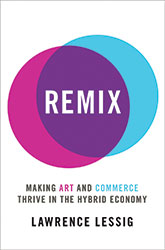
You and I, we’re criminals. We watch clips of TV shows on YouTube; we grab Rihanna MP3s on Lime Wire; we make mash-ups and post them on our MySpace pages. File sharing is rampant, and culture jamming is a worldwide phenomenon, but at what cost? Stanford law professor and noted digital culture expert Lawrence Lessig warns that “if the laws regulating culture are perceived to be morally unjust, that erodes the conditions within a culture for supporting the law more generally.” In Remix, Lessig explores how we got here and offers a way out.
Lauding the work of mash-up masters like Girl Talk and Danger Mouse, Lessig traces our current copyright muddle back to the time of John Philip Sousa, who campaigned against mechanically reproduced music a century ago, blaming player pianos for destroying the front-porch sing-along. Like Sousa, Lessig distinguishes passive reception of culture (read only) from active involvement in culture (read/write), and argues passionately for the artistic legitimacy of the latter, calling it “the very best of what these new technologies make possible.” But in the digital era, how to distinguish between piracy and art?
Lessig suggests file sharing be legal and taxed, providing compensation for artists. This bold proposal would decriminalize our kids, who download music faster than they text message, allow for creativity and innovation, and acknowledge the realities of the Internet age. An optimistic visionary and activist, Lessig is the Al Gore of the copyright crisis. But like global warming, our copyright mess was a long time coming, and its trend lines are sobering. Remix offers a hopeful vision of a better future; the question is, can we get there?















